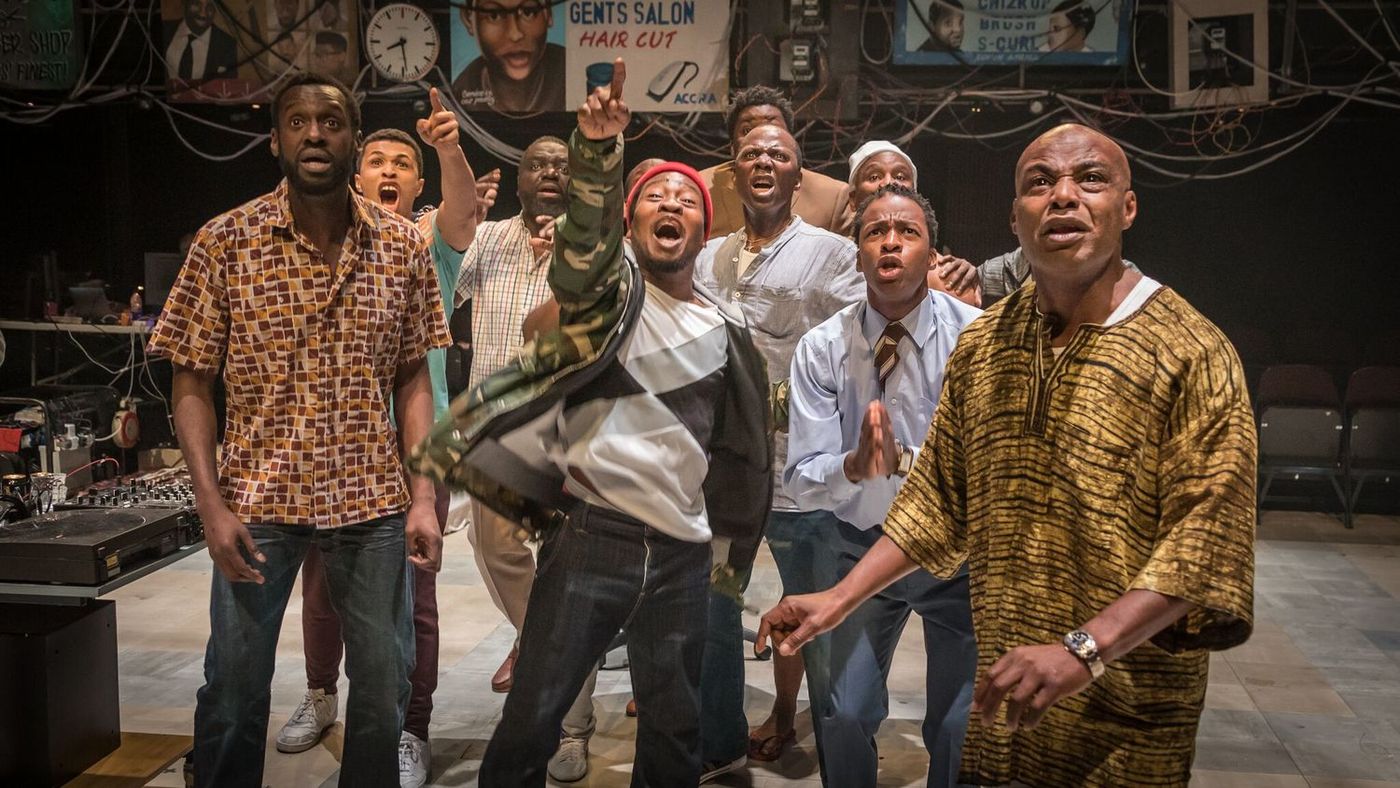Review: BARBER SHOP CHRONICLES, National Theatre

![]() Inua Ellams' dynamic new play debuted last June, to critical acclaim. Following its successful run at the West Yorkshire Playhouse, Barber Shop Chronicles returns to the National with a bang. The story takes its audience to barber shops in Peckham, Johannesburg, Lagos, Accra, Harare and Kampala.
Inua Ellams' dynamic new play debuted last June, to critical acclaim. Following its successful run at the West Yorkshire Playhouse, Barber Shop Chronicles returns to the National with a bang. The story takes its audience to barber shops in Peckham, Johannesburg, Lagos, Accra, Harare and Kampala.
But what is a barber shop? Well, it's a confessional booth, political hub, football stadium, pub, newsroom and, simply, the place to be. In them, everything is open for discussion - nothing is held back. Conversations happen that you might not expect to hear, and through Ellams' writing, the tone shifts to a much deeper level. It's political, heartwarming and humorous - all in equal measure.
The pre-show is an entire production in itself. Popular music plays, the audience are pulled up for mock haircuts and everyone dances. There are bright colours and patterns everywhere - all exuding so much vibrancy. I have never seen so much delight in an auditorium; the entire room's enthusiasm for what is happening is contagious.
What happens thereafter is a journey around the world; the setting may be different, but the vibe feels the same. Barbers are everywhere, but everyone has their own style - "a package", as it's referred to in the play. As a client you trust your barber explicitly to know what to do: be it a simple trim, or an aerodynamic cut that will make the girls swoon.
One of the play's most impressive attributes is Ellams' ability to go so deep into matters that seem trivial. A football match between Chelsea and Barcelona is used to signify a commonality between barber shops. They all cheer for a team, and at the same time discuss the racism that happens in the sport.
The movement direction used throughout (choreographed by Aline David) could easily become too chaotic, but the cast execute it with a fine finesse and rhythm. Featuring one of the best soundtracks I've ever heard used in theatre, the performers dance with an impressive energy, manoeuvring their barber capes like matadors performing a ritual.
I could easily write about each member of the cast in great detail, as they are all brilliant, and Bijan Sheibani's direction brings out thrilling performances. Patrice Naiambana multi-roles expertly, giving three clear contrasting characters all of equal merit, and the audience hang on Hammed Animashaun's every word - he is that funny. But the highlight moment of the evening comes from Kwami Odoom as Ethan.
Despite not speaking until the play's final moments, he delivers a scene (alongside Cyril Nri) that is incredibly powerful. He's a mixed-race boy auditioning for the role of a black man - but doesn't feel like he fits the ideal of strong black masculinity. His father abandoned him to go back to South Africa. This resulted in him growing up in a white community, thus losing touch with his African side, and leading to a lot of anxiety and insecurity.
The production makes the case that the stigma surrounding mental health is prevalent within the black community. There are many terms used within African culture to derogate people with the illness. Yoruba is a term originating from Nigeria meaning insane, the Shona word Benzi means stupidity, and in Accra the Ga term Sekeyelor means mad person.
It isn't just stigma that's apparent, but also fear and shame. There is a preconception that once someone has been diagnosed with a mental illness they can never overcome it - they will be ruined by the label for their entire life. The play makes the case for the need for intervention as early as possible, to prevent the prejudice against mental illness from growing.
So much more than just a story set in a barber shop, Sheibani's production is a triumph. It's one that is full of hope - after all, that is what these settings are: a lighthouse, a beacon for the community.
Barber Shop Chronicles at the National until 9 January
Photo Credit: Marc Brenner
Reader Reviews
Videos

